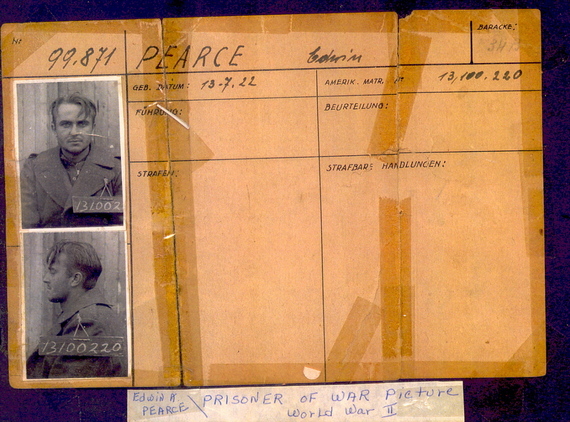I've thought a lot about what must have been going through my grandfather's head before he jumped. Was he afraid? Was he anxious? Did he have time to, really, have any thoughts at all?
Sorry, I'm getting ahead of myself. Let me back up. My grandfather, Edwin A. Pearce, was a veteran of United State Army Air Corps in World War II. In 1943, during one of the most infamous air battles of that war (or any war in modern history), known generally as the Schweinfurt Raid or "Black Thursday", my grandfather stood at the door to his B-17 Bomber, lovingly nicknamed "Patches" -- for its roughshod condition -- and prepared to leap into the middle of a still-raging air battle. His plane, upon which he was a rear gunner, had been hit and was going down. He grabbed his parachute which he was issued, but never trained to use, and prepared to leap some 20,000 plus feet in the air.
His 21-year-old body thrashed through the air so violently, his spine would need to be put back into alignment while in the captivity which awaited him on the ground below. The German fighters were encircling the American Airmen spread out in the air, changing the prop pitch of their planes to herd the servicemen, like flying cattle, so they would all hit the ground in close proximity. My grandfather's parachute had the air knocked out of it three times, and he would go in and out of consciousness on the perilous descent to the uncertain future below.
My grandfather would be a prisoner of war (POW) for nearly the next two years of his life in the infamous Stalag 17 prison camp. His German captors would feed him insect-infested soup once a day, a delicacy so tantalizing a young Eddie Pearce would climb above the light in his camp so he didn't have to see what he was eating. Many nights, as my grandfather laid in bed with the cold winds blowing through the bare clapboard walls of the camp -- a single woodstove struggling to provide a semblance of heat -- his body would shiver, violently.
One night, as my grandfather lay there, body quaking, he suddenly stopped, and felt a warm sensation throughout him. He felt drawn to the light so many people describe in near-death experiences, then all of sudden his body was cold again and he was back in that same prison bed he had come to know. He would remark decades later, at his own father's funeral that he didn't fear death, because he knew how "good it felt."
His ordeal concluded with a near-death march through the treacherous European winter conditions which had coated the terrain to meet the advancing Allies and, ultimately, his liberation. My grandfather returned home, to these United States of America, in 1945 and became a Pennsylvania State Trooper for the next 31 years of life, serving his country again, a country which was already forever indebted to him.
Perhaps if that wasn't enough, my grandfather retired in 1976 and spent much of the rest of his life searching for any information about his firstborn son, Edwin "Jack" Pearce, who was, himself, shot down in 1972 and declared Missing in Action (MIA). My grandfather would die before his son's, my uncle's, remains were returned in 2008. But, even in the last days of his earthly life, my grandfather still had the stretchmarks from malnutrition which had their origins from an experience he endured some 60-plus years earlier in that German POW camp, eating that daily culinary critter creation.
Growing up, I heard the story of his odyssey many times; it was an odyssey which made me proud and continues to make me proud of my grandfather and so many veterans like him, who served their country and the cause of this nation so nobly.
See for me, it is without question, that my grandfather, my uncle, the Senator from Arizona, and so many veterans throughout American history who were, and in some cases are, imprisoned or missing, are heroes. It's just that simple. There is no demagoguery which will change that. There is no non-apology which will change that. There is no pandering to the ills of populism which will change that. There is no deferment-patriarch of a posh Manhattan façade which will change that.
My grandfather's written words in a letter about his missing son seem more than enough to leave one with when reflecting on the lack of outrage by many of such an assertion made about American POWs: "I believe this system of government is the best ever created by man...[but] deceitful is the nation that, having heroes, betrays them."

